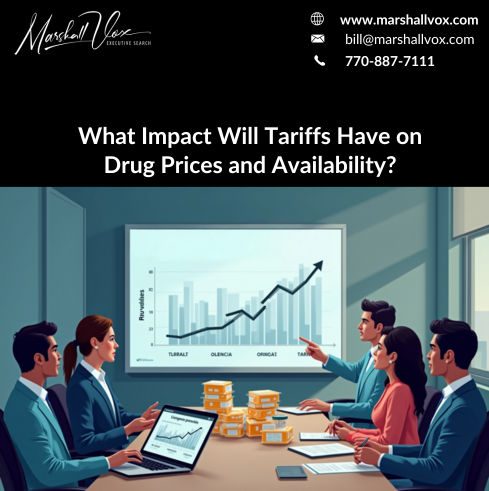In the international marketplace, tariffs have been a mechanism of economic policy employed by governments to defend home industries and control trade relations for decades. Tariffs have recently become the center of attention, especially in the drug industry. With new tariffs on imports, speculation is mounting about how these economic policies will influence the prices of drugs and their availability. The implications of such changes can be wide-reaching, affecting the healthcare system and the general public, who depend on low-cost medication.
The Role of Tariffs in Global Trade
Tariffs are taxes on imported goods, making foreign products more costly than domestic ones. In the case of drugs, most countries, including the United States, depend on imports for a high percentage of their drug supply. The pharmaceutical sector is heavily interlinked with international supply chains, from raw materials to final products. Such dependence on imports implies that tariff alterations will directly and profoundly affect drug prices.
Potential Impact on Drug Prices
One of the most direct impacts of higher tariffs is the escalation of drug costs. When tariffs are put on the raw materials or active ingredients used to create medications, production becomes more costly for manufacturers. These added costs are generally shifted to consumers and result in higher prices for prescription medication. Even if tariffs are first targeted at a small subset of products, the ripple effect can be seen throughout the entire market, mainly when a particular ingredient is integral to the manufacturing process of many medications.
The situation is complicated further by the fact that many pharmaceutical companies source their materials from a handful of countries. If tariffs hit those major suppliers, firms may not be able to find other sources or may pay even more due to a shortage of competition. In a few instances, pharmaceutical companies can try to absorb the increased expense. However, this will prove unsustainable in the long term and may contribute to shortages and decrease the supply of particular medicines.
Availability of Medications
Tariffs increase the price of drugs and may also influence their availability. Drug manufacturers depend on a fine line of international supply chains to ensure medications are manufactured, delivered, and shipped on schedule. Tariffs applied will disrupt such supply chains, mainly if the primary supplier is in a country where tariffs have been raised dramatically. Shipment delays, increased importation costs, and supply chain complexities could lead to drug shortages or delays in supplying vital medicines to patients.
This is especially concerning for drugs already in short supply due to complex production methods or constrained manufacturing capacity. Tariffs can further reduce the availability of such medicines, thus constraining patient access to essential medications. In extreme cases, healthcare professionals could be required to substitute one drug with another, possibly jeopardizing patient care.
The Broader Economic Impact
Although the immediate implications of drug pricing and availability are alarming, one must address the more significant economic reality. Rising drug prices may pressure consumers, especially those who use prescription medication to treat long-term conditions. For many people, even relatively small price increases can be economically debilitating. Patients with insufficient insurance coverage might even be unable to afford treatment, resulting in declining health outcomes.
Additionally, increased drug prices can burden public health systems, especially in countries where government programs significantly offer healthcare. Governments can be compelled to spend more on subsidizing the prices of medications, resulting in increased public expenditures and, in some instances, budget deficits. The increased financial burden on consumers and governments could have long-term effects on the healthcare system.
Potential Long-Term Solutions
Solving the problem of tariffs’ effect on drug prices and availability needs a multi-pronged strategy. One possible solution is negotiating trade agreements that provide more favorable tariffs on critical pharmaceutical products. By eliminating or lowering tariffs on raw materials or finished drugs, governments can stabilize prices and provide a consistent supply of drugs.
A further pathway for alleviating the effect of tariffs is developing local production of key medicines. Fostering local pharmaceutical manufacturing capabilities may stem import dependency and insulate the drug supply against fluctuations in foreign economies. However, it would require heavy investment and infrastructure development and might be challenging for all nations or sectors to achieve.
Lastly, global coordination might be vital in avoiding tariff-related unintended results. Through cooperative efforts, nations can make the international supply chain flow continuously, reducing losses in the consistency of essential medication availability. Intergovernmental healthcare institutions and industry cooperation also assist in keeping patients’ interests safe while making economic sense for trade policy management.
Conclusion
As tariffs affect numerous industries globally, the pharmaceutical industry is at a crossroads. The tariffs on medicine and raw materials could have important implications for drug prices and access, increasing the cost of drugs for consumers and possible shortages of essential medicines. The full extent of these effects is yet to be determined. Still, the problem underscores the need to balance trade policy with preserving access to affordable healthcare. Through careful solutions, governments, the pharmaceutical sector, and healthcare providers can collaborate to address this complicated issue and protect public health.
For more details, visit Forbes.




